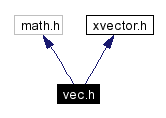
#include <math.h>#include "xvector.h"Include dependency graph for vec.h:

This graph shows which files directly or indirectly include this file:

Go to the source code of this file.
Defines | |
| #define | QFLOAT float |
| #define | XSQRT sqrtf |
| #define | XVector Vector |
| #define | YVector QVector |
| #define | QFLOAT double |
| #define | XSQRT sqrt |
| #define | XVector QVector |
| #define | YVector Vector |
Functions | |
| template<class XVector, class DoItType> void | forEach3dVector (XVector first, XVector last, DoItType DoIt, XVector increment) |
| forEach3dvector will cycle through all the possible Vectors in a given region, calling DoIt's () operator on each Vector. More... | |
| template<class XVector, class DoItType> void | forEach2dVector (XVector first, XVector last, DoItType DoIt, XVector increment) |
| for_each_2d_vector will cycle through all the possible Vectors in a given 2-dimensional region, calling DoIt's () operator on each Vector. More... | |
|
|
|
|
|
|
|
|
|
|
|
|
|
|
|
|
|
|
|
|
|
|
|
|
|
||||||||||||||||||||||||
|
for_each_2d_vector will cycle through all the possible Vectors in a given 2-dimensional region, calling DoIt's () operator on each Vector. for_each_2d_vector takes in a first and a last Vector: The first contains the starting coordinates adn the last contains the ending coordinates. first and last can either be of type Vector or QVector. Increment is a Vector which specifies how much to increment all of the different values. DoIt can be of any type, and is only required to have an operator() function that takes in a Vector. NOTE: If the z (k) value is required, use the for_each_vector function instead.
00083 {
00084 first.Set(floor(first.i/increment.i)*increment.i,
00085 floor(first.j/increment.j)*increment.j,
00086 first.k);
00087 last.Set(ceil(last.i/increment.i)*increment.i,
00088 ceil(last.j/increment.j)*increment.j,
00089 last.k);
00090 XVector xvec (first);
00091 for (first.j=xvec.j;first.j<last.j;first.j+=increment.j) {
00092 for (first.i=xvec.i;first.i<last.i;first.i+=increment.i) {
00093 DoIt(first);
00094 }
00095 }
00096 }
|
|
||||||||||||||||||||||||
|
forEach3dvector will cycle through all the possible Vectors in a given region, calling DoIt's () operator on each Vector. forEach3dVector takes in a first and a last Vector: The first contains the starting coordinates adn the last contains the ending coordinates. first and last can either be of type Vector or QVector. Increment is a Vector which specifies how much to increment all of the different values. DoIt can be of any type, and is only required to have an operator() function that takes in a Vector. NOTE: If the z (k) value is not needed, use the for_each_3d_vector function instead.
00059 {
00060 first.Set(floor(first.i/increment.i)*increment.i,
00061 floor(first.j/increment.j)*increment.j,
00062 floor(first.k/increment.k)*increment.k);
00063 last.Set(ceil(last.i/increment.i)*increment.i,
00064 ceil(last.j/increment.j)*increment.j,
00065 ceil(last.k/increment.k)*increment.k);
00066 XVector xvec (first);
00067 for (first.k=xvec.k;first.k<last.k;first.k+=increment.k) {
00068 for (first.j=xvec.j;first.j<last.j;first.j+=increment.j) {
00069 for (first.i=xvec.i;first.i<last.i;first.i+=increment.i) {
00070 DoIt(first);
00071 }
00072 }
00073 }
00074 }
|
 1.2.15
1.2.15